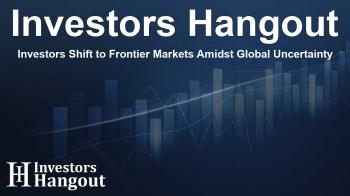Investors Shift to Frontier Markets Amidst Global Uncertainty

Emerging Market Investors Turn to Frontier Opportunities
As global tensions and unpredictable trade policies loom, many investors are seeking refuge in frontier markets. These markets offer an escape from the volatility brought on by political shifts, especially in the wake of recent U.S. policy changes.
Understanding Frontier Markets
Frontier markets are typically smaller developing economies in regions like Africa, Eastern Europe, and some parts of Asia and Latin America. While these markets can be risky, they have gained attention this year for their potential to provide investment growth without the weight of looming tariffs often associated with major emerging markets.
For instance, countries like Serbia are appealing due to their strong economic growth forecasts. In West Africa, nations such as Ghana and Zambia are emerging from debt issues, allowing them to refocus on economic improvements. Emerging market portfolio managers suggest that these markets are less likely to be affected by the unpredictable trading environment influenced by major international players.
The Allure of High-Yield Investments
In uncertain times, investors often gravitate toward safe-haven assets. However, recent trends indicate that frontier markets might offer compelling high-yield opportunities. Despite the risks tied to global events like the COVID-19 pandemic and geopolitical conflict, certain high-yield bonds from frontier markets have shown robust performance.
For example, bonds from countries with unique economic drivers, such as Argentina and Lebanon, performed exceptionally well last year. Analysts predict that this trend will continue into the next few years as local dynamics play a significant role in driving returns.
Unique Investment Stories in Non-Frontier Markets
Interestingly, larger non-frontier emerging markets like Turkey and South Africa are also garnering investor interest. Turkey's recent shift towards orthodox fiscal policies and plans for economic reconstruction in nearby regions have made it a more attractive destination for foreign investment.
South Africa benefits from a range of commodities, which could cushion its economy against geopolitical shocks, positioning it as a viable option for investors looking beyond traditional markets.
Potential Pitfalls in Emerging Economies
However, not all emerging economies are set to thrive. Institutions like JPMorgan have adjusted their recommendations for securities in Panama, reflecting concerns about financial stability under the current political climate. The increased scrutiny on nations with strong trading ties to the U.S. suggests some emerging economies might face challenges as they adapt to these new dynamics.
Looking Towards the Future
Given this unpredictable landscape, the search for investment opportunities in frontier markets seems to be a smart strategy for many. Investors are encouraged to stay informed and consider both the potential risks and rewards associated with these developing economies as they navigate through uncertain times.
Frequently Asked Questions
1. What are frontier markets?
Frontier markets are smaller, less developed countries often considered riskier than traditional emerging markets, but they offer unique investment opportunities.
2. Why are investors interested in frontier markets?
Investors see potential for growth in frontier markets, especially as they remain less affected by the geopolitical tensions influencing larger markets.
3. What risks are associated with frontier markets?
Although they offer growth potential, frontier markets can face considerable risks including political instability, economic volatility, and limited liquidity.
4. Are there non-frontier emerging markets worth investing in?
Yes, non-frontier markets like Turkey and South Africa are currently attracting attention due to favorable economic policies and diversified economies.
5. How should investors approach investments in uncertain times?
Investors should conduct thorough research, evaluate market conditions continually, and diversify their portfolios to manage risks effectively.
About The Author
Contact Thomas Cooper privately here. Or send an email with ATTN: Thomas Cooper as the subject to contact@investorshangout.com.
About Investors Hangout
Investors Hangout is a leading online stock forum for financial discussion and learning, offering a wide range of free tools and resources. It draws in traders of all levels, who exchange market knowledge, investigate trading tactics, and keep an eye on industry developments in real time. Featuring financial articles, stock message boards, quotes, charts, company profiles, and live news updates. Through cooperative learning and a wealth of informational resources, it helps users from novices creating their first portfolios to experts honing their techniques. Join Investors Hangout today: https://investorshangout.com/
The content of this article is based on factual, publicly available information and does not represent legal, financial, or investment advice. Investors Hangout does not offer financial advice, and the author is not a licensed financial advisor. Consult a qualified advisor before making any financial or investment decisions based on this article. This article should not be considered advice to purchase, sell, or hold any securities or other investments. If any of the material provided here is inaccurate, please contact us for corrections.

